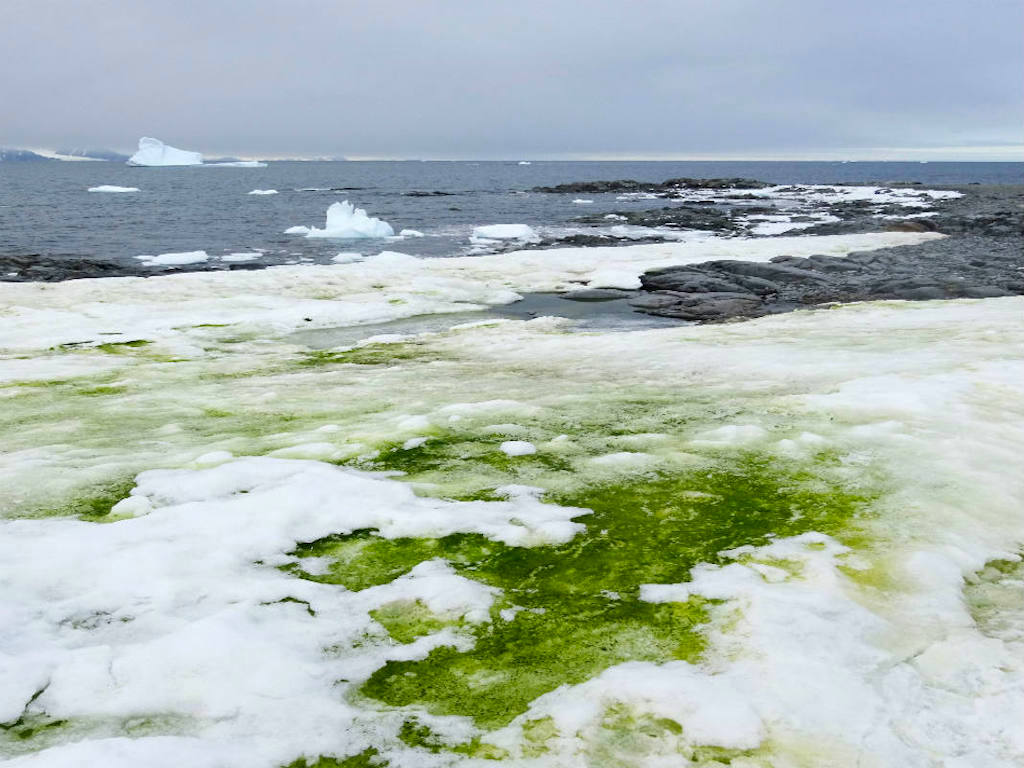3 Mins Read
In a new study, researchers have found that microscopic algae growing on the surface of snow in the Antarctic Peninsula is spreading as global temperatures continue to rise. While the melting of snow could lead to more algae growth, which can help sequester carbon dioxide, warmer temperatures could also affect wildlife populations such as penguins, which algae relies on for its source of nutrients to grow. In the long-run, the scientists say that if climate change doesn’t stop, the peninsula’s snow will completely melt, and there will be no algae at all.
The study, published in the journal Nature, was conducted by a team of scientists from the University of Cambridge and the British Antarctic Survey. They studied satellite data between 2017 and 2019 collected by the European Space Agency (ESA), and gathered measurements in Ryder Bay, Adelaide Island, the Fildes Peninsula and King George Island to map microscopic algae.
They found that global heating has led to microscopic algae growing on the surface of snow along the Antarctic Peninsula, turning the snow so green to the extent that it can be spotted from space. Scientists say that the algae relies on the excrement of marine birds and mammals, such as penguins, which are rich fertiliser for algae bloom.
“This is a significant advance in our understanding of land-based life on Antarctica, and how it might change in the coming years as the climate warms,” said co-author of the paper Matthew Davey from the University of Cambridge.
Algae growth doesn’t necessarily mean bad news. “Snow algae are a key component of the continent’s ability to capture carbon dioxide from the atmosphere through photosynthesis,” explained Davey.
But with more algae growth, the white snow will turn darker, which causes more of the sun’s heat to be absorbed. The scientists say we are therefore still in the dark about what the net impact of widespread algae growth might be.
They also highlighted that widespread algae growth, which is prompted by warming temperatures, may end up being stopped by increasingly hot weather as a result of climate change. Temperatures could rise so much that the Peninsula’s snow completely melts, taking away all the snow algae.
“If it warms up a bit, you get a lot more blooms. If it warms up a lot, the whole system could crash completely because there’s no snow,” said Davey.
The loss of snow could additionally negatively impact the survival of wildlife species such as penguins, which the algae relies on for its nutrients to grow.
Unprecedented temperature rise is already happening in Antarctica, especially in the Peninsula, the most northern part of the continent, which has the warmest temperatures in the Antarctic region. In January, the warmest part of the year for the Southern Hemisphere, temperatures average a little above 0 degrees celsius, but it is quickly warming up over time.
A heatwave in Antarctica melted around 20% of snow from Eagle Island within 9 days in February this year, said the researchers. One station logged record temperatures with a high of 18.3 degrees Celsius, which was warmer than the temperature in Hong Kong over the same period.
Aside from turning the region green, the speed at which the Antarctic region is heating up has the potential to lead to devastating impacts felt throughout the globe. Even small increases in warming could lead to the collapse of ice shelves along the Peninsula.
Ice shelves act as plugs to support and stabilise existing ice sheets that are attached to land. If they collapse, it could speed up the rate at which ice sheets disappear, which would release large quantities of carbon dioxide and methane that is sequestered in them back into the atmosphere.
It will also cause further sea-level rise, which has already impacted the physical security of communities in the Pacific island states, and will threaten the 1 billion people living along coastlines in the world, many of whom are in Asia.
Lead image courtesy of Matt Davey / University of Cambridge / SAMS / AFP.




